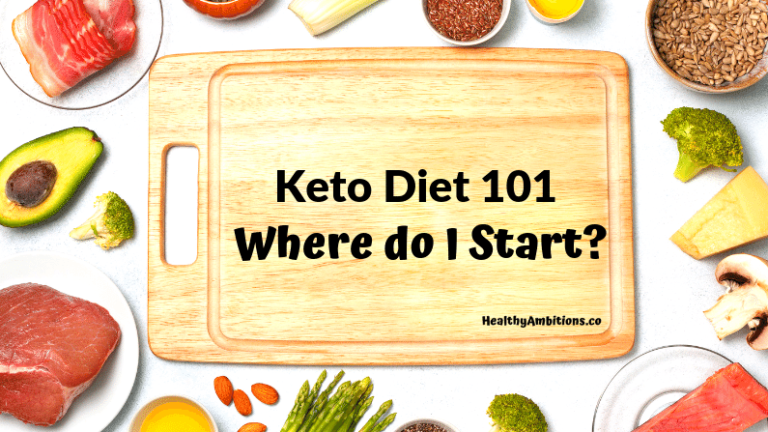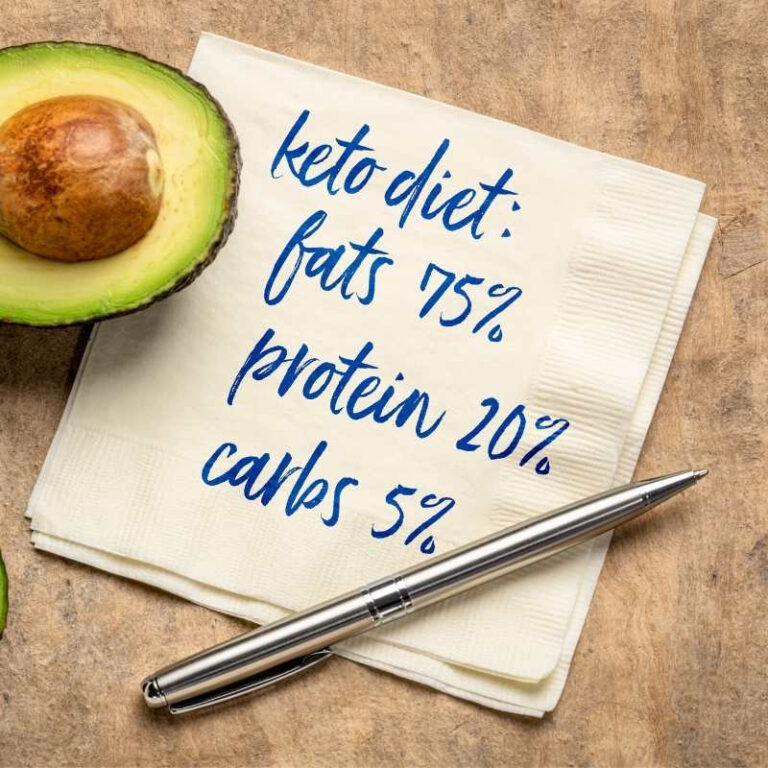Keto Basics: The Role of Ketones in Your Body
Welcome to the ketogenic diet— a unique and interesting aspect of healthy eating and nutrition.
In this world of healthy eating, you’ll hear a lot about the role of ketones in your body. Ketones are super important because they provide energy for your body when you’re on a ketogenic diet.
Instead of using glucose, your body will start using these ketones as a fuel source. In this post, you’ll learn all about them and how crucial they are for doing keto right.

This post may contain affiliate links, which helps keep this content free. Please read our disclosure for more info.
Understanding Ketones
So, what are these ketones? In the simplest terms, ketones are organic compounds your body uses for energy when it’s running low on its usual fuel, glucose.
Glucose typically comes from the carbohydrates in your diet. It’s kind of like your body’s favorite go-to energy source under normal circumstances.
But here’s where the ketogenic diet turns things on their head. The diet is all about keeping those carbohydrates really low.
Now, your body, still needing to fuel up, won’t have enough glucose to depend on. It’s kind of like when you’ve got guests coming over, and you realize you’re out of snacks. You have to get creative with what you have, right?
That’s exactly what your body does. It turns to your fat stores and starts a process called ketogenesis.
During ketogenesis, your liver takes the fat and converts it into ketones, kind of like making homemade snacks from what you have in the pantry.

So now, instead of relying on glucose for energy, your body starts using these ketones to keep everything up and running. It’s a pretty neat survival trick if you think about it.
While they might seem a bit complicated at first, ketones are really just your body’s way of making sure it always has a source of energy, even when its usual fuel is in short supply.
And it’s this shift from using glucose to using ketones that’s at the heart of what makes the ketogenic diet so unique.
The Benefits of Ketones
Ketones, besides being a fascinating scientific concept, carry with them a range of potential health benefits.
From assisting in weight loss to offering brain health advantages, ketones could be the unsung heroes in a journey toward better health.
Weight Loss
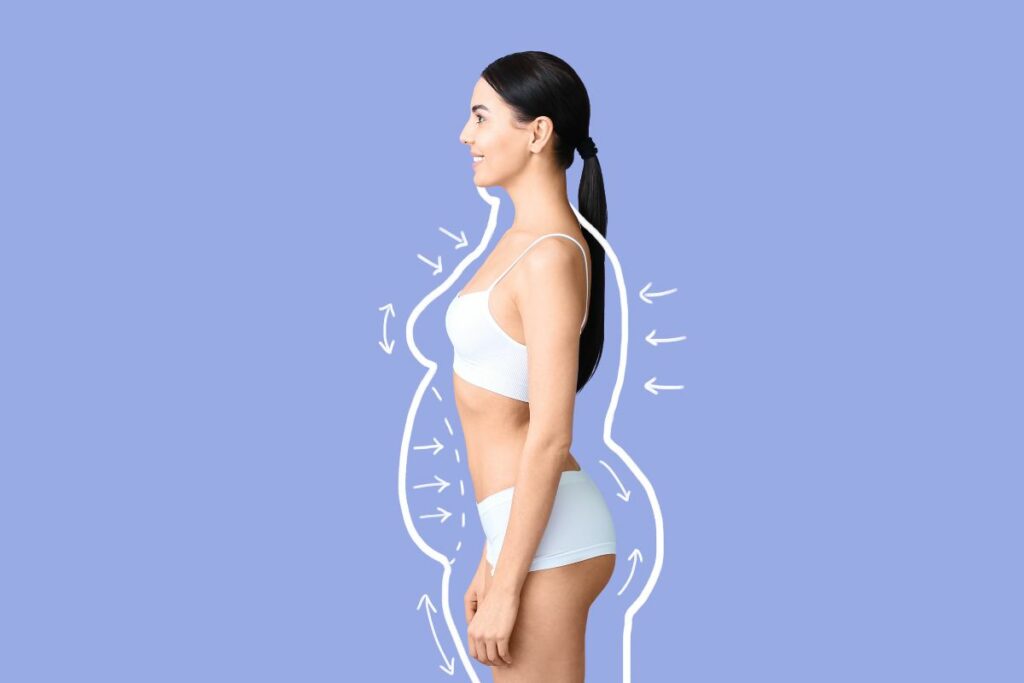
The first and most well-known benefit of ketones lies in their ability to facilitate weight loss.
When the body makes the switch from relying on glucose to using fat for energy, it burns through stored fat to produce these ketones.
Think of it like utilizing a long-forgotten savings account – the more you draw from it, the more your balance decreases.
In this case, the ‘balance’ is your body’s fat reserves, and dipping into this account might just lead to shedding those extra pounds.
Brain Health

The benefits of ketones extend beyond the bathroom scales. Research is beginning to show potential advantages for brain health as well.
The brain, a veritable powerhouse, requires a constant supply of fuel. Typically, glucose fulfills this role. But when glucose is scarce—like during a ketogenic diet—the brain can flex its adaptability muscles and use ketones as its fuel.
This alternative fuel source could potentially enhance cognitive function and mental clarity.
Imagine swapping your car’s regular fuel for a high-performance alternative, possibly leading to a smoother and more efficient ride.
Not only that, but early research is investigating the potential of ketones in reducing the risk of neurological conditions.
While these studies are still in their infancy and more research is certainly needed, the preliminary findings offer a glimmer of hope and a new avenue of exploration.
Whether the goal is weight loss or improved cognitive health, ketones could have a significant role to play. They aren’t just the stars of the ketogenic diet but might be key players in overall health and well-being.
How to Promote Ketone Production
Adopting a ketogenic diet involves more than merely reducing your carb intake. You are fine-tuning your body, where fats, proteins, and carbs must be carefully balanced to work together efficiently.
Besides this dietary balancing act, certain lifestyle adjustments can also help boost the production of ketones.
Balancing the Macronutrients
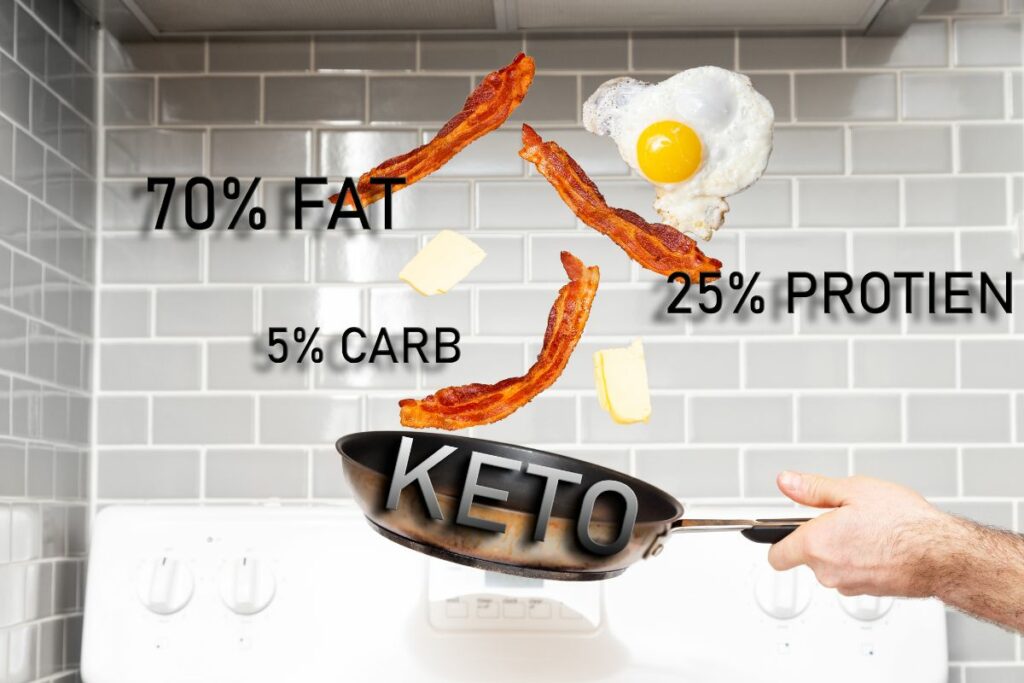
The first thing to know about a ketogenic diet is that it’s all about macronutrients. These are the fats, proteins, and carbs that make up our food and supply our bodies with energy.
The idea is to adjust the usual macronutrient mix so that fats take center stage, proteins play a supporting role, and carbs have a minor part.
Fats become the star of the show, making up a significant portion of the diet. They are no longer the villains; they’re the fuel that your body needs.
Proteins are essential too but in moderation. They help to maintain muscle mass and assist in various bodily functions.
Carbs, which typically provide quick energy, are significantly reduced to make room for fats and proteins.
Lifestyle Changes

Adjusting your diet isn’t the only way to promote ketone production. Certain lifestyle changes can also lend a helping hand.
For example, incorporating intermittent fasting into your routine can give ketosis a nudge in the right direction.
Intermittent fasting involves alternating between periods of eating and fasting. It’s kind of like turning the lights on and off at regular intervals to save on electricity.
When you’re in the fasting state, your body, needing energy but not receiving it from food, is more likely to start burning fat for fuel and produce ketones.
Regular Exercise

Regular exercise can also help to kickstart ketosis. When you exercise, you burn through your body’s glycogen stores (the storage form of glucose).
Once these stores are used up, your body starts to break down fats for energy, resulting in an increase in ketone levels.
Promoting ketone production isn’t just a one-time thing. It’s more of a lifestyle adjustment that involves a careful balancing of your diet and incorporating supportive practices into your routine.
Misconceptions about Ketones and the Ketogenic Diet

In the sea of nutritional information available, it’s easy for misunderstandings about the ketogenic diet and ketones to float to the surface.
There are a few key misconceptions that often pop up and it’s important to separate the fact from the fiction.
Ketosis Vs. Ketoacidosis
One of the most common mix-ups is between ketosis and ketoacidosis. They might sound similar, but they’re actually very different.
Ketosis, the goal of the ketogenic diet, is a natural metabolic state where the body, due to a lack of glucose, starts burning fat for energy and produces ketones. It’s like your body’s plan B for when carbs aren’t readily available.
Ketoacidosis, on the other hand, is a dangerous medical condition most often seen in people with type 1 diabetes. It occurs when there are too many ketones in the blood, making it too acidic.
This is not a state you want your body to be in and it requires immediate medical attention.
So, while the names might sound similar, it’s crucial to understand that ketosis is generally safe and beneficial while ketoacidosis is a harmful and potentially life-threatening condition.
Potential Side Effects of the Ketogenic Diet

Switching to a ketogenic lifestyle, like any significant change in diet, can come with some potential side effects.
Some people might experience what’s commonly known as the ‘keto flu‘ in the initial stages of the diet. This can include symptoms like fatigue, headaches, and irritability.
But it’s worth noting that these symptoms are typically temporary, and there are strategies to manage them, like staying hydrated and ensuring you’re getting enough electrolytes.
Another common misconception is that eating a lot of fats is ‘unhealthy’. However, it’s crucial to understand that the type of fats consumed matters.
On a well-formulated ketogenic diet, you’ll focus on consuming healthy fats like avocados, nuts, and seeds, rather than unhealthy trans fats.
Monitoring Ketone Levels
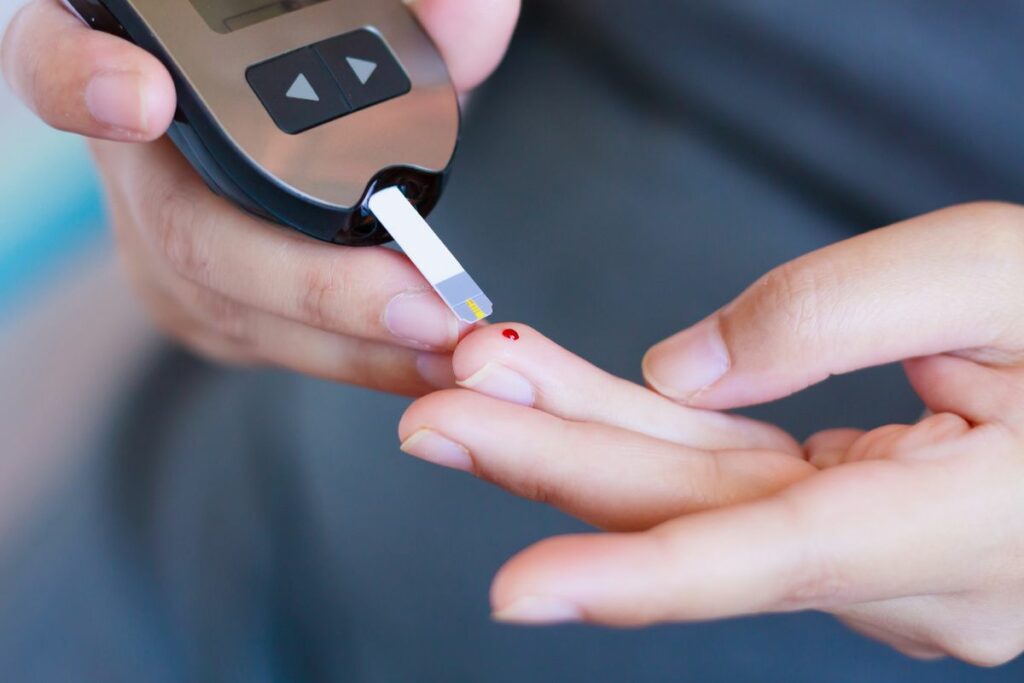
A key part of following a ketogenic diet is keeping an eye on your ketone levels. It’s kind of like tracking your speed when driving – you want to be sure you’re in the right zone to get where you’re going safely and efficiently.
There are a few different ways you can do this, each with its own pros and cons.
Urine Strips
One of the most accessible methods is using urine strips. These handy little tools are dipped in a urine sample and change color based on the concentration of ketones present.
They’re relatively inexpensive and easy to use at home. But, while they’re a good starting point, they’re not always the most accurate since hydration levels can affect the results.
Blood Tests
If you’re looking for a more precise measurement, a blood ketone meter might be the way to go.
These devices work a bit like a glucose meter, requiring a small blood sample, usually taken from the fingertip. They provide a specific measurement of the blood ketone level at that moment.
They are more accurate than urine strips but also more invasive and generally more expensive.
Breath Tests
Breath ketone meters are a less invasive option. These devices measure the amount of acetone, a type of ketone, in your breath.
While they can be a bit pricier upfront, they can be used repeatedly without the need for additional supplies, like test strips.
Understanding Your Ketone Levels

Monitoring ketone levels isn’t just about making sure you’re in ketosis. Different levels of ketones can be optimal for different health goals.
For example, weight loss might require a different ketone level compared to cognitive benefits or athletic performance.
Understanding where you want your levels to be and tracking them can help you tailor your ketogenic diet to best meet your health objectives.
Keto Journey: From Understanding Ketones to Embarking on a Fat Loss Challenge
Grasping the role of ketones in the body is a valuable tool for anyone interested in or already pursuing a ketogenic diet.
Knowledge, after all, provides the power to make informed decisions about one’s own health and well-being.
Introducing the Keto 21-Day Fat Loss Challenge
But knowledge isn’t just about understanding—it’s also about application. So, for those ready to put this understanding into action, there’s the Keto 21-Day Fat Loss Challenge.

This challenge provides a guided, step-by-step program to kick-start the ketogenic journey, focusing on weight loss goals.
It takes the guesswork out of the process and provides a structured plan to help participants navigate the ketogenic diet successfully.




